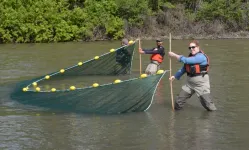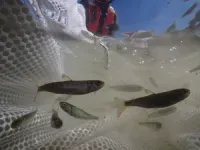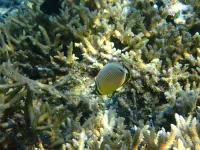(Press-News.org) Climate change has led to earlier spring blooms for wildflowers and ocean plankton but the impacts on salmon migration are more complicated, according to new research.
In a new study, published in the journal Nature, Ecology & Evolution, Simon Fraser University (SFU) researcher Sam Wilson led a set of diverse collaborators from across North America to compile the largest dataset in the world on juvenile salmon migration timing. The dataset includes 66 populations from Oregon to B.C. to Alaska. Each dataset was at least 20 years in length with the longest dating back to 1951. Only wild salmon, and not salmon from hatcheries, were included.
Sam Wilson, a postdoctoral researcher in the Salmon Watersheds Lab at SFU and lead author on the review, says, “Field scientists from many different organizations work really hard to collect data on the migration of smolts, day after day, year after year. Bringing this data together really showcases the importance of long-term monitoring.”
Many salmon species have migration timing that has substantially changed over the last 20 or more years. Pink and chum salmon had the fastest rates of change (migrating seven days per decade earlier), while other species’ migration timing has not been changing, on average.
However, a deeper dive into the data showed that there was greater variation between populations within species than between different salmon species. These population-specific changes were unpredictable with currently available climate and geographic data.
“We were really surprised. Yes, there were really strong signals of climate change as many salmon tended to be migrating earlier, but it was incredibly variable and unpredictable.” Dr. Wilson says.
In response to the same level of warming, the study showed that some populations had earlier migration timing, while others had no change, or even migrated later in the year.
When the timing of juvenile salmon migrations and food availability matches, this creates ideal conditions for surviving those first few months in the ocean and can directly influence how many adults return.
The researchers are concerned that salmon do not appear to be responding to changes in the coastal ocean, which could make mismatches more common under future climate change.
Dr. Matthew Sloat, co-author of the review and director of science at the Wild Salmon Centre, notes that one important accomplishment of the study was to bring scientists and datasets together.
“This study brought together more than 50 scientists from government and community organizations, with everyone contributing their expertise and data to better understand this important, but often overlooked life stage.”
It also shows the importance of long-term datasets, he says.
“Long term monitoring projects are expensive and logistically challenging to run, and yet are increasingly important to better our understanding of how climate change may be effecting salmon.”
As climate change continues to alter ecosystems, being able to predict what species or populations might be the most vulnerable can help to prioritise conservation. Study co-author Jonathan Moore notes that when those changes are difficult to predict, a precautionary management approach is important for the long-term conservation of ecologically, culturally, and economically important species, such as Pacific salmon.
“Climate change is here and it is changing salmon and their ecosystems,” says Moore, a professor with the Salmon Watersheds Lab in the Faculty of Science at SFU. “Many of these changes are going to be unpredictable, which calls for the protecting of salmon biodiversity and their habitats.”
END
Juvenile salmon migration timing responds unpredictably to climate change
2023-05-02
ELSE PRESS RELEASES FROM THIS DATE:
State study: labor induction doesn’t always reduce caesarean birth risk or improve outcomes for term pregnancies
2023-05-02
ANN ARBOR, Mich. – In recent years, experts have debated whether most birthing individuals would benefit from labor induction once they reach a certain stage of pregnancy.
But a new statewide study in Michigan suggests that inducing labor at the 39th week of pregnancy for people having their first births with a single baby that is in a head down position, or low risk, doesn’t necessarily reduce the risk of caesarian births. In fact, for some birthing individuals, it may even have the opposite effect if hospitals don’t take a thoughtful approach to ...
OSU-Cascades researcher explores AI solution for tracking and reducing household food waste
2023-05-02
BEND, Ore. – A researcher at Oregon State University-Cascades has received funding to develop a smart compost bin that tracks household food waste.
The project led by Patrick Donnelly, assistant professor of computer science in the OSU College of Engineering, seeks to make a dent in a multi-billion-dollar annual problem in the United States: More than one-third of all food produced in the U.S. goes uneaten.
“At every other step of the agricultural supply chain, food waste is tracked, measured and quantified,” Donnelly ...
Survival from cardiac arrest less likely in Asian American Pacific Islander communities
2023-05-02
DALLAS, May 1, 2023 — Science tells us that when a cardiac arrest happens, bystander CPR can double or even triple the chances of survival.[1] Asian American and Pacific Islander (AAPI) adults who experience cardiac arrest outside of a hospital setting have a substantially lower chance of receiving bystander CPR.[2] During Asian American Pacific Islander Heritage month in May, the American Heart Association, a global force for healthier lives for all, is asking people to “Be the Beat” for their family and learn Hands-Only ...
Your health is in your hands during American Stroke Month
2023-05-02
DALLAS, May 1, 2023 — Strokes can happen to anyone, at any age. In fact, globally about one in four adults over the age of 25 will have a stroke in their lifetime.[1] During American Stroke Month, the American Stroke Association, a division of the American Heart Association, as part of a nationally supported collaboration with HCA Healthcare and the HCA Healthcare Foundation, will teach people everywhere that stroke is largely preventable, treatable and beatable.
A stroke happens when normal blood flow in the brain is interrupted. When parts of the ...
Blocking a tiny RNA may forestall age-related bone and muscle loss, inflammation
2023-05-02
AUGUSTA, Ga. (May 2, 2023) – Inhibiting a tiny RNA whose levels significantly increase with age, along with problems like weaker bones and sagging muscles, may be a way to keep our bodies more youthful and healthy, scientists say.
MicroRNAs help regulate gene expression and consequently the function of our cells, and several, including one called microRNA-141-3p, have been implicated in the ills of aging, like increasing levels of potentially damaging chronic inflammation and that shrinking muscle mass.
“When we age in all these complications like chronic inflammation, muscle loss, bone loss, this microRNA is elevated,” says Sadanand ...
Fish thought to help reefs have poop that’s deadly to corals
2023-05-02
HOUSTON – (May 2, 2023) – Feces from fish that are typically thought to promote healthy reefs can damage and, in some cases, kill corals, according to a recent study by Rice University marine biologists.
Until recently, fish that consume algae and detritus — grazers — were thought to keep reefs healthy, and fish that eat coral — corallivores — were thought to weaken reef structures. The researchers found high levels of coral pathogens in grazer feces and high levels of beneficial bacteria in corallivore feces, which they say could act like a “coral probiotic.”
“Corallivorous ...
Do people and monkeys see colors the same way?
2023-05-01
New findings in color vision research imply that humans can perceive a greater range of blue tones than monkeys do.
“Distinct connections found in the human retina may indicate recent evolutionary adaptations for sending enhanced color vision signals from the eye to the brain,” researchers report April 25 in the scientific journal, Proceedings of the National Academy of Sciences.
Yeon Jin Kim, acting instructor, and Dennis M. Dacey, professor, both in the Department of Biological Structure at the University of Washington School of Medicine in Seattle, led the international, collaborative project.
They were joined ...
Organ transplant policies need an overhaul!
2023-05-01
INFORMS Journal Manufacturing & Service Operations Management New Study Key Takeaways:
Matching supply and demand of organs can provide broader sharing in a way that results in greater transplant equity.
By indiscriminately enlarging the pool of supply locations from where patients can receive offers, they tend to become more selective, resulting in more offer rejections and less efficiency.
The model accounts for the variation of “incidence of disease” (i.e., demand) and “availability of deceased-donor organs” ...
Scientists describe carbon cycle in a subglacial freshwater lake in Antarctica for first time
2023-05-01
TAMPA, Fla. (May 1, 2023) – Subglacial lakes that never see the light of day are among the least accessible frontiers of science, brimming with more tales yet untold than even the planets of our solar system. One thing seems certain: where there is water, there is life -- even if said water is at the bottom of a frigid lake, in pitch darkness, below more than a half mile of the West Antarctic Ice Sheet.
As reported in AGU Advances, scientists analyzed the chemical fingerprint of the ocean and microbes retrieved from sediments and water at the bottom of a subglacial ...
Sensor enables high-fidelity input from everyday objects, human body
2023-05-01
Images // Video
Couches, tables, sleeves and more can turn into a high-fidelity input device for computers using a new sensing system developed at the University of Michigan.
The system repurposes technology from new bone-conduction microphones, known as Voice Pickup Units (VPUs), which detect only those acoustic waves that travel along the surface of objects. It works in noisy environments, along odd geometries such as toys and arms, and on soft fabrics such as clothing and furniture.
Called SAWSense, for the surface acoustic waves it relies ...






